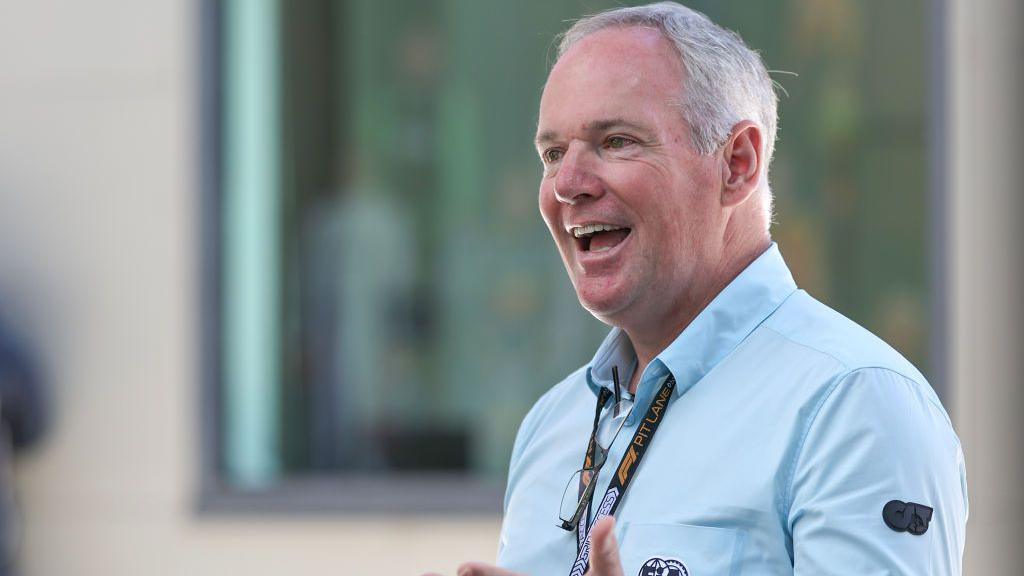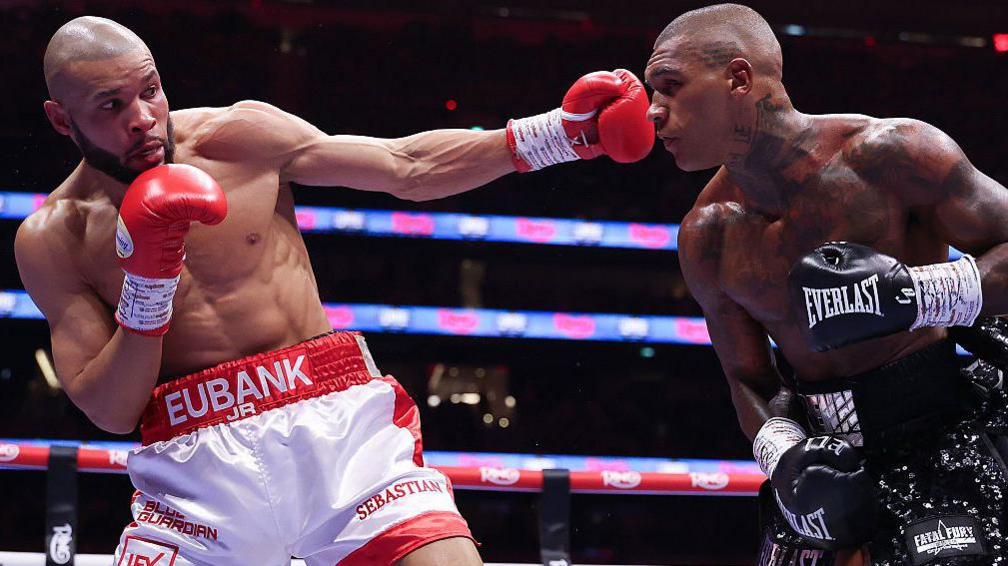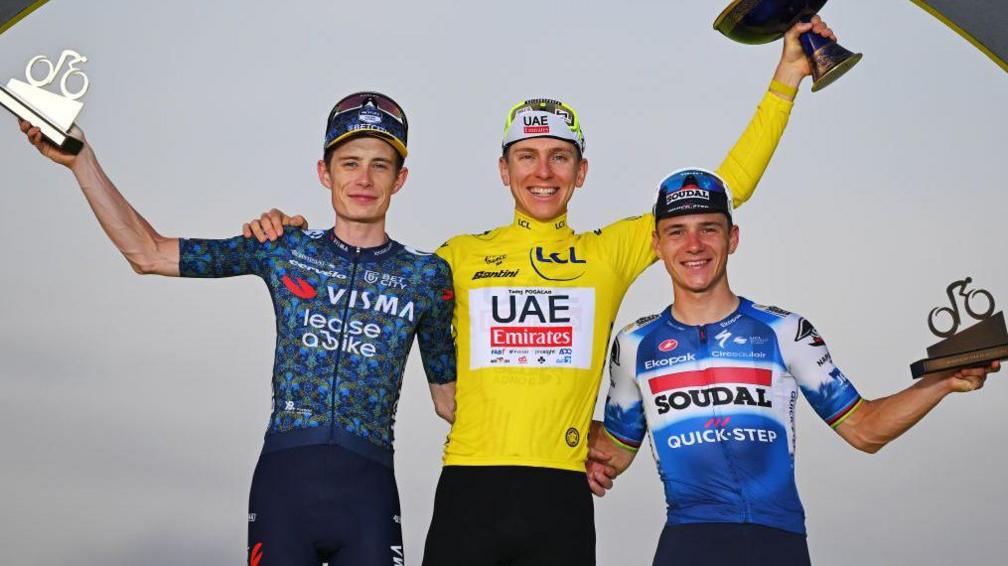Steve Sutcliffe
BBC Sport journalist
The 112th edition of the Tour de France gets under way in Lille on Saturday with the three-week race ending on the Champs-Elysees in Paris on Sunday, 27 July.
The riders will tackle six mountain stages including trips to the Pyrenees and Alps during the gruelling 3,320km (2,063-mile) race.
There will also be two individual time trials, with the second featuring the steep climb up to the Altiport in Peyragudes.
BBC Sport looks at all 21 stages of La Grande Boucle analysing where it could be won and lost.
Saturday, 5 July – stage one: Lille Metropole – Lille Metropole, 184.9km
Winner: Jasper Philipsen
Report: Philipsen wins stage one to claim first yellow jersey
Jasper Philipsen was the first rider to wear the yellow jersey this year – claiming the maillot jaune for the first time in his career.
A sprint finish was expected after a flat stage beginning and ending in Lille, and Alpecin-Deceuninck’s lead-out train delivered the 27-year-old in the perfect position to claim his 10th stage win.
Sunday, 6 July – stage two: Lauwin-Planque – Boulogne-sur-Mer, 209.1 km
The second stage is also the longest in this year’s race covering 209.1km with the peloton making their way through the countryside of the Hauts-de-France region, heading towards the Strait of Dover.
Monday, 7 July – stage three: Valenciennes – Dunkirk, 178.3km
This should be another good chance for the Tour’s fast men to shine.
Tuesday, 8 July – stage four: Amiens Metropole -Rouen, 174.2km
Both Amiens and Rouen have been the preserve of sprinters in previous editions of the Tour but that will not be the case this time around.
Wednesday, 9 July – stage five: Caen – Caen, 33km
The first of two individual time trials arrives on wide and completely flat roads of Caen.
Thursday 10 July – stage six: Bayeux – Vire Normandie, 201.5 km
Six categorised climbs and more than 3,400m of vertical gain mean this is regarded as the most challenging flat stage in the Tour’s recent history.
Friday, 11 July – stage seven: Saint-Malo – Mur-de-Bretagne Guerledan, 197 km
The race passes through the home village of five-time winner Bernard Hinault during a relatively tame opening 175km of stage seven.
However, expect bedlam as the finishing line approaches with a closing circuit that mirrors the 2021 stage.
Saturday, 12 July – stage eight: Saint-Meen-le-Grand – Laval Espace Mayenne, 171.4 km
Sunday, 13 July – stage nine: Chinon – Chateauroux, 174.1km
When you think of Chateauroux one rider immediately springs to mind – Mark Cavendish.
The first of the Manx Missile’s record 35 stage wins arrived in the city in 2008 and he repeated that success on the Avenue de la Chatre in 2011 and 2021.
Monday, 14 July – stage 10: Ennezat – Le Mont-Dore Puy de Sancy, 165.3 km
While the 4,400m of elevation gain across seven category-two climbs and a category-three ascent is likely to put the sprinters in trouble almost from the start, the general classification contenders are likely to keep their powder dry on a stage that looks made for the breakaway specialists.
There will likely be a strong posse of home riders trying to get in any group heading up the road with the objective of becoming the first French stage winner on Bastille Day since Warren Barguil in 2017.
Wednesday, 16 July – stage 11: Toulouse – Toulouse, 156.8km
Thursday, 17 July – stage 12: Auch – Hautacam, 180.6km
The first real big day in the mountains could see fireworks in the GC race.
The route up to the ski resort at Hautacam on the roads above Lourdes takes the peloton on the route where five-time champion Miguel Indurain tore the race (and his rivals) apart in 1994.
Friday, 18 July – stage 13: Loudenvielle – Peyragudes 10.9km
An individual time trial takes the riders from the valley floor up to the runway of Altiport 007 in Peyragudes.
After a flat start, there will be over 8km uphill and no hiding place for the GC favourites in the race of truth.
Saturday, 19 July – stage 14: Pau – Luchon-Superbagneres, 182.6 km
A classic and mouth-watering mountain stage in the Pyrenees arrives at the end of week two.
Nearly 5,000m of elevation gain is packed into climbs up the mighty hors-categorie Tourmalet followed by the Col d’Aspin and Col de Peyresourde.
On a day when the GC riders will be need to be at their very best, the strongest climbers will have their focus on the fight for the King of the Mountains jersey and hope to contest the stage on the pull up to the ski resort of Luchon-Superbagneres.
Sunday, 20 July – stage 15: Muret – Carcassonne 169.3km
A transitional stage arrives as the race heads from the Pyrenees towards the Alps, which looks suited to the strongman sprinters who can cope with some climbing.
Tuesday, 22 July – stage 16: Montpellier – Mont Ventoux, 171.5km
Stage 16 is a flat route until one of the most legendary mountains in Tour history comes into view at the end with the potential to turn the race on its head.
With no categorised climbs all day before Mont Ventoux, and the intermediate sprint featuring 112km into the stage, it would be no surprise if the peloton remains largely intact until then.
Wednesday, 23 July – stage 17: Bollene – Valence, 160.4km
With two big Alpine tests still to come the GC teams will probably play second fiddle to the sprint teams when it comes to trying to rein in any breakaways.
Thursday, 24 July – stage 18: Vif – Courchevel Col de la Loze, 171.5km
This year’s queen stage comes with more than 5,500m of elevation across 171.5km of racing and three legendary climbs which makes it arguably the toughest run of the entire Tour.
All three ascents fall under the hors categorie, with the Col du Glandon, a 21.7km drag with with sections at double digits just for starters.
Friday, 25 July – stage 19: Albertville – La Plagne, 129.9km
The last real mountain stage represents the final opportunity for those high in the GC standings to make a play for the yellow jersey.
The route from Albertville to La Plagne covers almost 130km, and includes five leg-sapping ascents.
Plenty of points will be up for grabs again in the race for the the polka-dot jersey points available but this is really a last-chance saloon in terms of the overall race.
Saturday, 26 July, – stage 20: Nantua – Pontarlier, 184.2km
The penultimate stage sees the race snake over the hills of the Jura towards Pontarlier.
Sunday, 27 July, – stage 21: Mantes-la-Ville – Paris Champs-Elysees, 132.3km
The Tour returns to it’s traditional Paris finish after relocating to Nice last year due to the Olympics.
However, it does so with a twist, given the cobbled climb up to the Sacre-Cœur Basilica features three times in a throwback to the road race in the 2024 Paris Games.
























